Key takeaways:
- Reparations politics involves not only financial compensation but also the restoration of dignity and the acknowledgment of historical injustices faced by marginalized communities.
- Engaging in diverse dialogues enhances understanding, empathy, and the potential for collective healing, as each person’s experience shapes their viewpoint on reparations.
- Historical context is crucial in understanding reparations, with notable examples like the U.S. government’s payments to Japanese Americans, highlighting the importance of acknowledging past wrongs.
- Activism should translate personal stories and insights from discussions into actionable policy reforms that address the needs of marginalized groups impacted by systemic inequities.

Understanding reparations politics
Reparations politics encompasses the discussions and actions aimed at addressing historical injustices, particularly those faced by marginalized communities. I remember sitting in a community forum where a veteran activist passionately spoke about the emotional weight of acknowledgment—an essential first step. Hearing their personal stories, I realized how vital it is to not only recognize past wrongs but also to understand the ongoing impact of those injustices on current generations.
When I think about reparations, I often reflect on the complexities involved. It’s not just about financial compensation; it’s about restoring dignity and acknowledging the pain that has been woven into the fabric of society. Have you ever considered how deeply personal this issue is for many? Conversations with friends who have experienced systemic discrimination opened my eyes to the everyday realities that underscore the need for reparative justice.
Engaging in these dialogues has taught me that reparations politics involves many layers, including economic, social, and political elements that intersect in profound ways. I recall a discussion where someone mentioned how reparations could reshape societal structures, sparking a debate that challenged my previous assumptions. This dialogue fueled my desire to learn more, as it highlighted that understanding reparations isn’t just academic—it’s immensely personal and transformative for all involved.
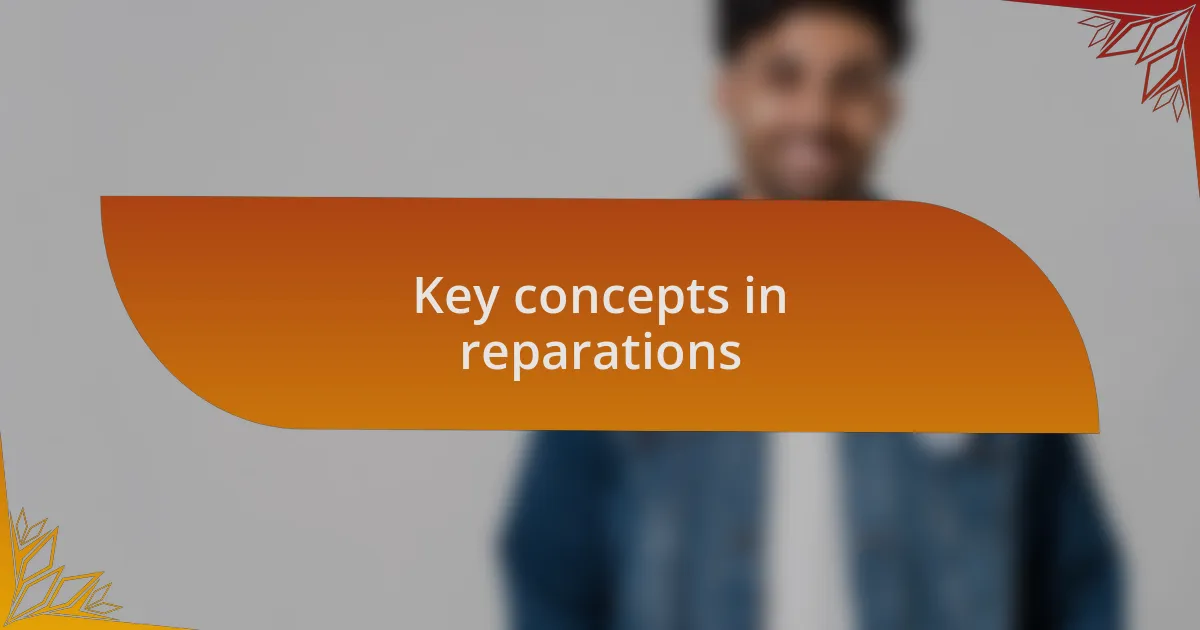
Key concepts in reparations
Reparations are not merely about money; they’re deeply rooted in the quest for justice and recognition of historical wrongs. I recall a conversation with a friend whose family had been directly affected by discriminatory policies—listening to them described how a simple acknowledgment of their struggles felt like a weight lifted off their shoulders. It highlighted for me that reparations encompass holistic healing, where financial components exist alongside emotional and social restoration.
The concept of “restorative justice” frequently emerges in discussions surrounding reparations. This framework emphasizes the importance of repairing harm through dialogue, accountability, and making amends. During a community workshop I attended, we were encouraged to share personal stories of loss and injustice, which ultimately fostered a sense of unity. Isn’t it fascinating how sharing our experiences can catalyze collective healing?
Moreover, the idea of reparations extends beyond simple compensation; it involves structural change to rectify systemic inequities. I remember a thought-provoking exchange in an online forum where someone proposed that reparations could lead to policy reforms in education and housing—areas foundational to community well-being. Isn’t it crucial to consider how these changes could create a more equitable future? That moment broadened my perspective, reinforcing the notion that reparative justice can create a ripple effect across society.
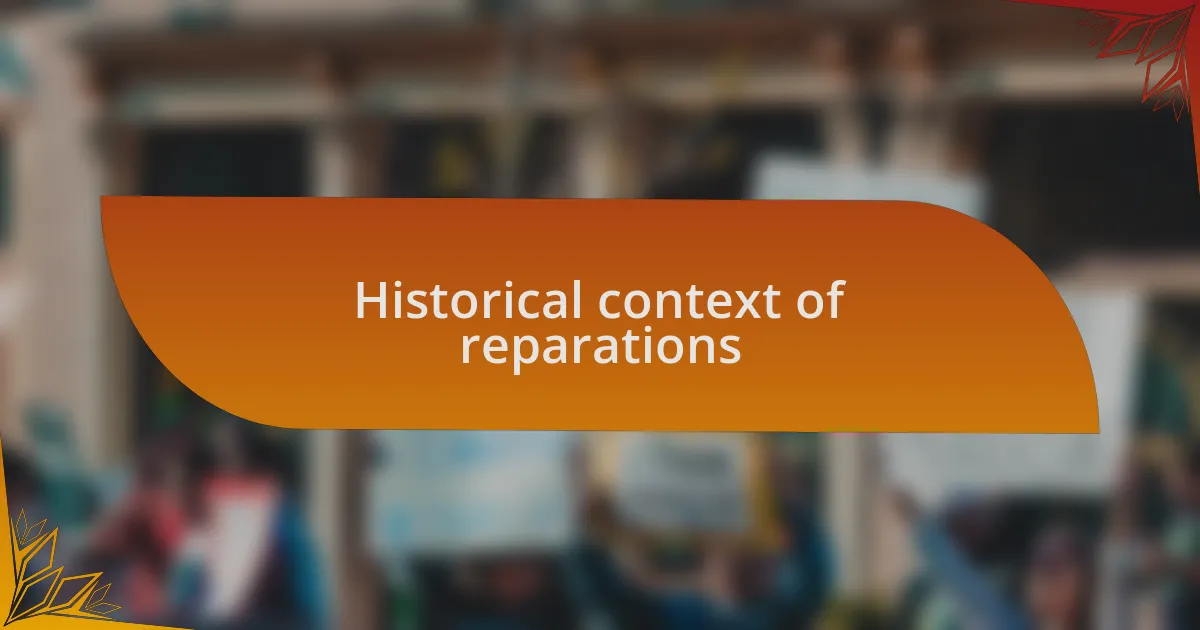
Historical context of reparations
Acknowledging the historical context of reparations requires us to look back at the atrocities of slavery and colonialism. I once participated in a discussion where we traced the roots of reparative justice back to the aftermath of the Civil War, when thousands of newly freed Black Americans were promised land and opportunity—a promise largely unfulfilled. Reflecting on that moment, I found myself questioning how society can impose such injustices yet shy away from making corrections decades later.
The history of reparations includes significant moments like the U.S. government’s payments to Japanese Americans interned during World War II. It struck me during a recent reading that these reparations were not just financial but also symbolic, aiming to acknowledge the trauma inflicted on a community. Isn’t it remarkable how such steps spark new conversations about justice and accountability, even in the face of longstanding denial?
Across various nations, you can find instances where reparations were granted, revealing a global struggle for justice. I vividly recall attending a seminar where scholars pointed out how Germany’s reparations to Holocaust survivors set a precedent—one that many nations still grapple with today. It left me pondering: if nations can acknowledge their past wrongs, why is it so difficult for so many to do the same? This reflection reinforces the need for honest dialogue regarding reparation practices, illustrating how deeply embedded these historical injustices are in our societal frameworks.
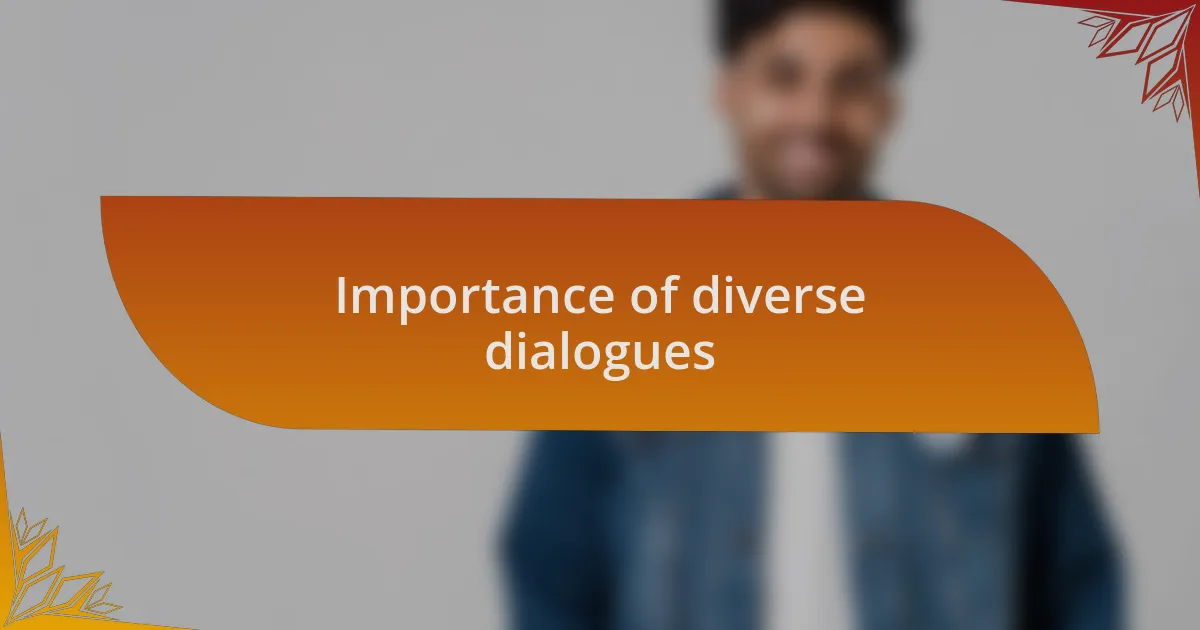
Importance of diverse dialogues
Diverse dialogues are essential for understanding the multifaceted perspectives on reparations. I remember sitting in a workshop where voices from various backgrounds shared their stories, and it was eye-opening to hear how each person’s experience shaped their viewpoints. That setting reminded me that every conversation has the potential to enrich our understanding and foster empathy—two critical elements in addressing such a contentious issue.
Engaging in discussions that include a variety of voices can illuminate the complexities of reparations that might be overlooked otherwise. I once listened to a powerful testimony from a descendant of a slave owner, grappling with their family’s history. It raised an important question for me: how can we facilitate healing when we confront these uncomfortable truths? It became clear to me that diversity in dialogue allows for a deeper examination of these challenging narratives, creating room for apology and reconciliation.
Moreover, the importance of respectful dialogue cannot be overstated. During a panel discussion on reparations, I witnessed how an open exchange of ideas transformed tension into understanding. When people reflect on their experiences without defensiveness, it opens pathways to solutions that are rooted in compassion. Isn’t it true that confronting our past as a community requires us to listen as much as we speak? That realization solidified my belief in the power of diverse dialogues in shaping reparative justice.
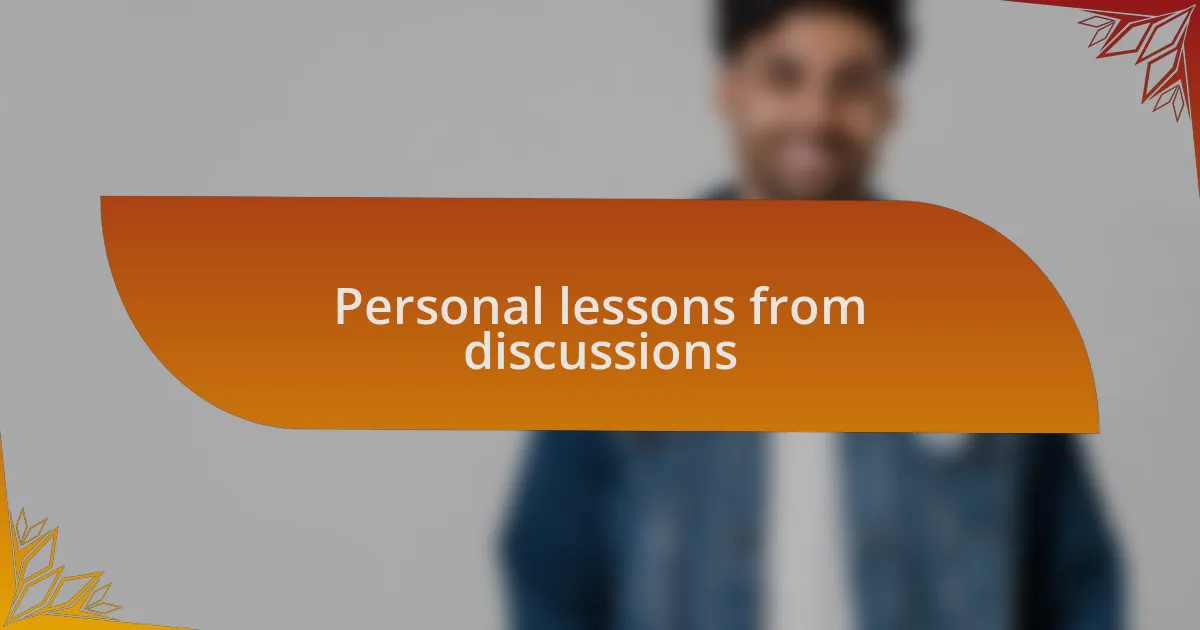
Personal lessons from discussions
There’s a profound lesson I gleaned from participating in a community roundtable where people from varying backgrounds shared their experiences with reparations. One individual spoke about how their family’s legacy had impacted their sense of identity and responsibility. Listening to them made me realize that personal histories intertwine with collective narratives. Have you ever stopped to consider how deeply our backgrounds shape our perspectives? It’s a reminder that acknowledging these layers is crucial for moving forward.
I also found that challenging discussions can sometimes lead to unexpected connections. I remember a moment when a participant, initially resistant to the idea of reparations, shared their fears about loss and change. It struck me how vulnerability can allow for deeper conversation. This experience taught me that while we may start from opposing views, empathy can bridge those gaps. Isn’t it fascinating to think that our differences might spark the most meaningful insights?
Lastly, I’ve discovered the value in embracing discomfort during dialogues. In a conversation about the economic impacts of reparations, I felt a knot in my stomach; I realized this unease was a signal of growth. Engaging with uncomfortable truths pushes us beyond our comfort zones. Isn’t it worth it to explore these feelings together? My personal takeaway is that discomfort can be a powerful catalyst for understanding and healing within the reparations discourse.
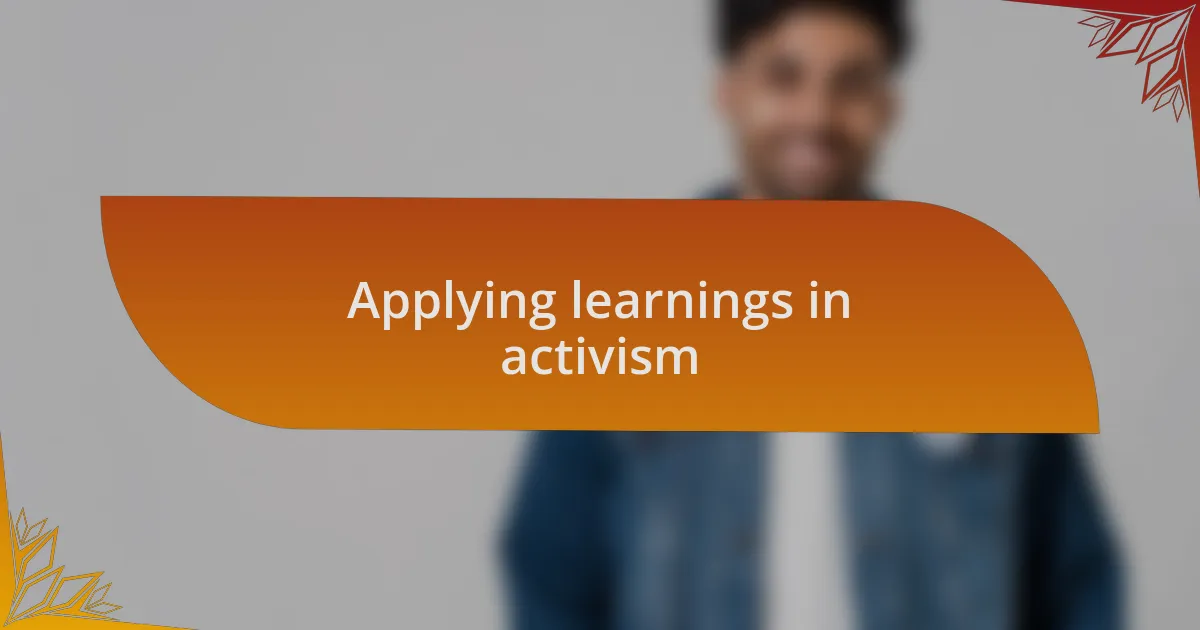
Applying learnings in activism
Activism is often about taking what we’ve learned from diverse dialogues and translating it into action. I remember attending a local protest where individuals from varying communities rallied for justice. Inspired by our earlier discussions, I found myself speaking up more boldly, sharing insights from those personal stories I had heard. Isn’t it incredible how those conversations can empower us to raise our voices?
One powerful moment for me was when I connected with people from marginalized groups who expressed the need for targeted policy initiatives. I realized that it’s essential for us as activists to not only promote awareness but also to advocate for actionable solutions. How can we expect real change if we aren’t pushing for reforms that address the specific needs and histories of those most affected? This is where our collective understanding becomes essential.
Every time I engage in activism, I strive to remember the stories behind the statistics. When I helped organize a workshop on reparative justice, I noticed that including personal narratives made the impact of policy discussions more resonant. I believe that weaving these lessons into our activism creates a richer, more compelling narrative for change. Are we not responsible for ensuring that our movements reflect the voices of those they aim to support?